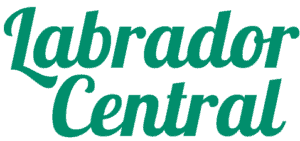
Raising a Labrador Retriever puppy is an exciting journey filled with love, companionship, and plenty of tail-wagging moments. Labradors are one of the most popular dog breeds in the world, known for their friendly disposition, intelligence, and unwavering loyalty. However, like any puppy, they require proper care, training, and attention to thrive.
As a new Labrador Retriever owner, the most important thing is to ensure that your furry pal is healthy and happy. Taking good care of your Lab since it is a puppy is crucial, as it will grow into a healthy dog.
Here’s a comprehensive guide to help you navigate through the process of raising a Labrador Retriever puppy:
RELATED POST: NEW LABRADOR PUPPY ESSENTIALS

Puppy-proof your home
Before you bring your new furry friend home, it’s important to make sure that your living space is safe and secure for them. You should remove any potential hazards, such as toxic plants, small objects, and electrical cords.
Additionally, consider investing in baby gates to block off certain areas of your home, and provide a designated space for your puppy to play and rest.
This will help to keep your puppy safe and healthy and provide them with a comfortable and secure environment to grow and play in.
Nutrition
Proper nutrition is essential for your Labrador puppy’s growth and development. Consult with your veterinarian to determine the best diet plan based on factors such as age, weight, and activity level.
Choose high-quality puppy food that is rich in nutrients and avoid overfeeding to prevent obesity.
Training
Early training is crucial for shaping your Labrador puppy’s behavior and establishing a strong bond. Start with basic commands such as sit, stay, and come, using positive reinforcement techniques like treats and praise. Consistency and patience are key to successful training sessions.
Socialization
Labradors are social creatures that thrive on human interaction and companionship. Introduce your puppy to a variety of people, animals, and environments from a young age to help them develop confidence and good social skills. Regular outings to the park, doggy daycare, and obedience classes can aid in the socialization process.
Exercise
Labrador Retrievers are a high-energy breed that requires plenty of physical exercise to stay healthy and happy. It is recommended to provide between 15 minutes to half an hour and a of daily exercise, while adult retrievers need between an hour to an hour and a half of physical activity each day.
Additionally, providing mental stimulation through puzzle toys and training exercises is also beneficial for their overall well-being.
Here are some great toys and gadgets that will help keep your Labrador busy and active.
Grooming
While Labradors have short coats that are relatively low-maintenance, regular grooming is still necessary to keep them looking and feeling their best. Brush your puppy’s coat weekly to remove loose hair and prevent mats. Trim their nails, clean their ears, and brush their teeth regularly to maintain overall hygiene.
Healthcare
Schedule regular wellness check-ups with your veterinarian to monitor your puppy’s health and ensure they are up to date on vaccinations and preventive care. Discuss preventive measures for common health issues such as hip dysplasia, obesity, and ear infections.
Set a veterinarian visit schedule
It’s very important to take your Labrador to the vet for regular checkups, vaccinations, and dewormings, and to keep parasites at bay. Dogs hate going to the vet, but if you take your dog to see the vet from a young age, It will get used to being handled by the vet, and it won’t be such a stressful endeavor in the future.
Pet Insurance
Veterinary care can be costly, especially in the case of emergencies or chronic conditions. Consider investing in pet insurance for your Labrador puppy to help cover unexpected medical expenses.
Pet insurance can provide peace of mind knowing that you can afford the best possible care for your furry friend without worrying about financial constraints. If you want to find the best pet insurance for your labrador, click here.

Behavioral issues
Like all puppies, Labrador Retrievers may exhibit behavioral problems such as chewing, digging, and excessive barking. Address these issues promptly with positive reinforcement training techniques and seek professional help if needed. Consistency and patience are key to overcoming behavioral challenges.
Spaying or neutering
Discuss with your veterinarian the appropriate time to spay or neuter your Labrador puppy. This procedure can help prevent unwanted behaviors and health problems in the future.
Conclusion
In conclusion, raising a Labrador Retriever puppy is a rewarding experience that requires dedication and effort. By providing proper care, training, and socialization, you can set your puppy up for a happy, healthy, and fulfilling life.
Remember to enjoy the journey and embrace the unconditional love and joy that your Labrador puppy brings into your life.
















